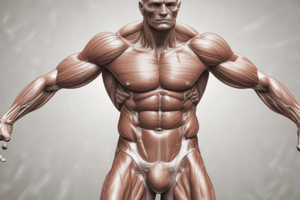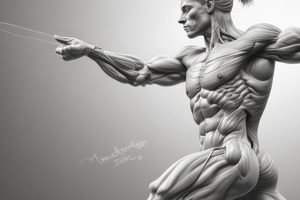Podcast
Questions and Answers
What is the purpose of the main exercise phase in a workout?
What is the purpose of the main exercise phase in a workout?
- To slowly bring the heart rate back to normal levels
- To gradually increase body temperature and heart rate
- To challenge the body and push it to its limits for desired fitness results (correct)
- To extend specific muscles and hold the position
Which of the following best describes the main exercise phase?
Which of the following best describes the main exercise phase?
- Involves the most intense part of the workout (correct)
- Targets slowly bringing heart rate back to normal levels
- Designed to gradually adjust the body to increased demand
- Involves light aerobic activity like walking
What determines the duration and intensity of the main exercise phase?
What determines the duration and intensity of the main exercise phase?
- Current heart rate levels
- Resting state of muscles
- Fitness level, goals, and type of exercise being done (correct)
- Degree of muscle soreness experienced
Which phase involves extending specific muscles and holding the position?
Which phase involves extending specific muscles and holding the position?
During the main exercise phase, what is the primary goal for the body?
During the main exercise phase, what is the primary goal for the body?
Which type of exercise focuses on keeping your heart, lungs, and circulatory system healthy?
Which type of exercise focuses on keeping your heart, lungs, and circulatory system healthy?
What is another name for strength exercises?
What is another name for strength exercises?
How do flexibility exercises contribute to overall fitness?
How do flexibility exercises contribute to overall fitness?
Which type of exercise helps reduce the risk of weak bones and slouching?
Which type of exercise helps reduce the risk of weak bones and slouching?
Why are balance exercises particularly important for older adults?
Why are balance exercises particularly important for older adults?
Which type of exercise aims to help your body stay limber and improve range of motion?
Which type of exercise aims to help your body stay limber and improve range of motion?
Which movement at the ankle involves the foot pointing inferiorly?
Which movement at the ankle involves the foot pointing inferiorly?
What defines circumduction in terms of limb movement?
What defines circumduction in terms of limb movement?
Which type of hand movement involves touching the thumb to the pad of any finger on the same hand?
Which type of hand movement involves touching the thumb to the pad of any finger on the same hand?
Which term describes the anterolateral movement of the scapula allowing the shoulder to move anteriorly?
Which term describes the anterolateral movement of the scapula allowing the shoulder to move anteriorly?
In what movement does the sole of the foot move away from the median plane?
In what movement does the sole of the foot move away from the median plane?
Which type of exercise involves a circular motion but is more accurately described as conical due to a 'cone' formed by the moving limb?
Which type of exercise involves a circular motion but is more accurately described as conical due to a 'cone' formed by the moving limb?
Flashcards are hidden until you start studying
Study Notes
Phases of Exercise
- Warming up before exercise allows the body to adjust gradually to increased demands on the heart, muscles, breathing, and circulation.
- Warm-ups increase body temperature, heart rate, and range of motion, and protect against injury and muscle soreness.
- The main exercise phase is designed to challenge the body and push it to its limits to achieve desired fitness results.
- The cool-down phase involves slowly bringing the heart rate and breathing back to normal levels and allowing muscles to gradually return to their resting state.
- The cool-down phase typically involves light aerobic activity such as walking.
Anatomical Terms of Movement
- Static stretching involves extending specific muscles and holding the position.
- Planterflexion refers to the extension of the ankle, so that the foot points inferiorly.
- Inversion involves the movement of the sole towards the median plane.
- Eversion involves the movement of the sole away from the median plane.
- Opposition involves touching the pad of any one of your fingers with the thumb of the same hand.
- Reposition is the reverse of opposition, which consists of separating the fingers and thumb.
- Circumduction is a conical movement of a limb extending from the joint at which the movement is controlled.
- Protraction describes the anterolateral movement of the scapula on the thoracic wall that allows the shoulder to move anteriorly.
- Retraction refers to the posteromedial movement of the scapula on the thoracic wall, which causes the shoulder region to move posteriorly.
Types of Exercise
- Endurance exercises, or aerobic exercise, increase breathing and heart rate, and improve overall fitness.
- Strength exercises, or strength training, build up muscles and can reduce the risk of weak bones and slouching.
- Flexibility exercises stretch muscles and help the body stay limber, improving range of motion, posture, breathing, and circulation.
- Balance exercises help prevent falls, especially in older adults, and maintain independence.
Principles of Exercise (FITT)
- FITT principles are not mentioned in the text.
Safety Precautions and Basic First Aid (RICE)
- RICE is not mentioned in the text.
Studying That Suits You
Use AI to generate personalized quizzes and flashcards to suit your learning preferences.




